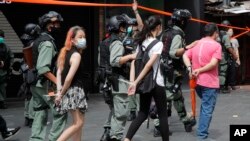A U.N. monitoring committee is calling for the repeal of Hong Kong’s National Security Law (NSL), saying it undermines the fundamental rights and freedoms of the people in the territory. The U.N. Human Rights Committee, which monitors the implementation of the International Covenant on Civil and Political Rights, has just issued its concluding observations on the situation in Hong Kong.
The 18-member committee said it was deeply concerned about the overly broad interpretation of Hong Kong’s National Security Law. It noted the law was passed by the National People’s Congress of China without consultation with the people of Hong Kong.
Committee Vice-Chair Christopher Arif Bulkan said more than 200 people, including 12 children, have been arrested since the enactment of the law in 2020 on grounds of endangering national security.
“The committee underscored the shortcomings of the NSL, including the lack of clarity of the term national security and the possibility of transferring cases from Hong Kong to mainland China, which is not a state party to the covenant for investigation, prosecution, trial, and execution of penalties,” Bulkan said.
Britain handed control of Hong Kong to China in 1997 under the “one country, two systems” principle. The agreement, which is enshrined in the so-called “Basic Law,” protects rights such as freedom of speech and assembly in the territory for 50 years. China replaced the agreement, 23 years after it was enacted, with the National Security Law.
Hong Kong is a signatory of the International Covenant on Civil and Political Rights under the Basic Law. As such, Bulkan said, the territory must abide by the obligations, the rights and freedoms prescribed in the document.
Though China is not a party to the Covenant, he said the human rights enshrined in the treaty are paramount. He said local legislation cannot derogate from the human, universal rights protected in the agreement.
“The NSL, for instance, asserts alongside that a jurisdiction that tends to override or could threaten that primacy,” he said. “And so that is one of the first reasons why we call for its repeal because it is incompatible with preserving the rights and freedoms under the covenant.”
The committee expressed concern about the chilling effect the NSL is having on civil society organizations. It said many trade and student unions under threat from the law have relocated or ceased to operate.
The independent experts noted the Hong Kong government has not provided assurances that civil society representatives who have participated in the review would be protected from charges under the NSL. They said they have asked authorities not to prosecute them.




